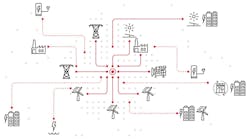ERDF, a company owned by the French utility EDF has selected technology solutions from Teradata as part of a redesign of its information system used to manage, process and analyze large sets of data generated by its smart grid.
ERDF manages 95 percent of the power systems in France, and after considering multiple proposals decided upon the Teradata Data Warehouse Appliance with the new Teradata Database, backed with Professional Services for systems maintenance and integration.
The Teradata solution was a natural fit for ERDF because of the utility's need for accelerated power, flexibility and scalability -- which make it a suitable environment to support the massive volumes of data generated by 35 million smart power meters – projected for deployment in France by 2022. Each meter is expected to send readings every 15 minutes to ERDF – an expected 2,000 billion readings per year.
The enormous volume of data will include traditional power consumption data as well as multiple new types, analytic profiles and categories analyzed from smart meter data usage.
The deployment of Teradata is part of ERDF's innovative approach to substantially increase the analytic capacities of ERDF by making fresh data quickly available. With this end-to-end and detailed data, ERDF can better understand and profile usage patterns, and then scale the power system more effectively to provide improved service to customers. The legacy system that has been used by ERDF can no longer be scaled to support such large and growing datasets and complex analytics.
The strategic plan for the Teradata solution and services implementation is to design and implement an enterprise-class data foundation that is resilient, scalable, and sustainable with peak performance attributes. The environment will support the considerable forthcoming workload and help ERDF strengthen its analytic capacities and result in more informed business decisions and enhanced economic value.
Another benefit in the rapid processing and analysis of smart data is ensuring compliance with ever-changing regulations.


